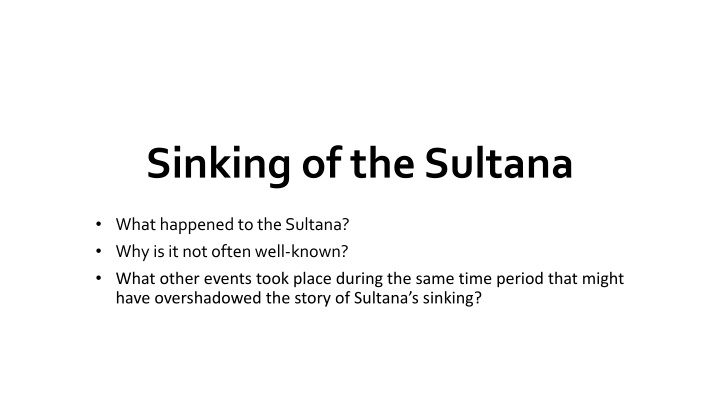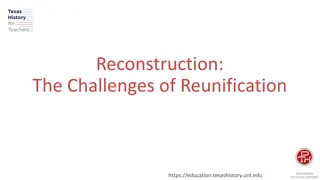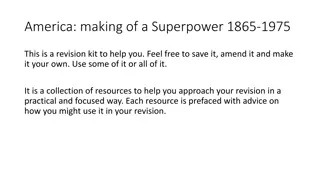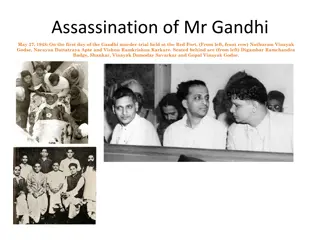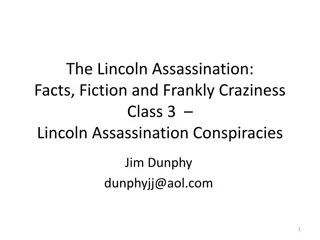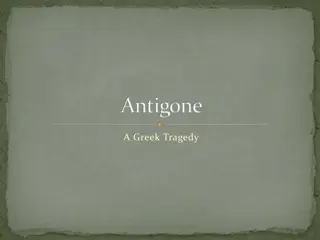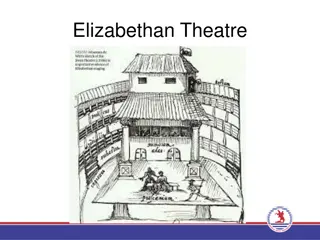Tragedy of the Sultana and Lincoln Assassination in 1865
The sinking of the Sultana, a steamboat, in 1865 resulted in one of the deadliest maritime disasters in U.S. history, yet it remains relatively obscure. The tragic event occurred in the midst of other significant occurrences, like the assassination of President Lincoln by J. Wilkes Booth. The overcrowded Sultana, carrying Union soldiers returning home after the Civil War, is a stark reminder of the dangers faced during that tumultuous period.
Download Presentation

Please find below an Image/Link to download the presentation.
The content on the website is provided AS IS for your information and personal use only. It may not be sold, licensed, or shared on other websites without obtaining consent from the author.If you encounter any issues during the download, it is possible that the publisher has removed the file from their server.
You are allowed to download the files provided on this website for personal or commercial use, subject to the condition that they are used lawfully. All files are the property of their respective owners.
The content on the website is provided AS IS for your information and personal use only. It may not be sold, licensed, or shared on other websites without obtaining consent from the author.
E N D
Presentation Transcript
Sinking of the Sultana What happened to the Sultana? Why is it not often well-known? What other events took place during the same time period that might have overshadowed the story of Sultana s sinking?
What do you notice about the number of passengers aboard Sultana? Do you think this depicts a safe vessel or method of transportation? Why or why not? Bankes, Thomas W, photographer. Helena, Arkansas. Ill- fated Sultana. Arkansas Helena Mississippi River United States, 1865. [photographed, printed later] Photograph.
Appalling circumstance! The President dead! Escape of the Murderer!
The shooting of the President is described in graphic detail. Do you think this is different from the way news articles are written today? Why or why not? Does the article name the sources from which it gathered the information about the assassination? Do you think it is based on eyewitness accounts or heresay? Explain your thoughts. How do you think that this event affected news coverage for the time period? NEWBURYPORT, APRIL 15, TWO O OLCK. APPALLING CIRCUMSTANCE! THE PRESIDENT IS DEAD! Escape of the Murderer! ATTEMPT ON THE LIFE OF SECRETARY SEWARD. J. Wilkes Booth, the Actor, the Assassin. Washington, April 14. As si1ent Lincoln and wife visited the theatre this evening, for the purpose of witnessing the performonce of the American Cousin. It was announced in the papers that Gen. Grant would also be present, but that gentleman took the late train of cars for New Jersey. The theatre was densely crowded, and everybody seemed delighted with the scene before them. During the third act, and while there was a temporary pause for one of the actors to enter, a sharp report of a pistol was heard, which merely attracted attention, but suggested nothing serious until a man rushed to the front of the President s box, waving a long dagger in his right hand, exclaiming, Sic semper tyrannis and immediately leaped from the box, which was in the seeond tier, to the stage beneath and ran across to the opposite side, making his escape amid the bewilderment of the audience from the rear of the theatre, and, mounting a horse, fled. The scream of Mrs. Lincoln first disclosed the fact to the audience that the President had been shot, when all present rose to their feet, lunging toward the stage, many exclaiming: Hang him! hang him! The excitement was of the wildest possible description, and of course there was an abrupt termination of the theatrical performance. There was a rush toward the President s box, where cries were heard Stand back and give him air! Has any one stimulants? On a hasty examination it was found that the President had been shot through the head above and back of the temporal bone, and that some of the brain was oozing out. He was removed to a private house opposite the theatre, and the Surgeon General of the Army and other surgeons were sent for to attend to his condition. On an examination of the private box blood was discovered on the back of the cushioned rocking chair on which the President had been sitting, also on the partition and on the floor. A common single barrellee pocket pistol was found on the carpet. A military guard was placed in front of the private residence to which the President had been conveyed. An immense crowd was in front of it, all deeply anxious to learn the condition of the President Appalling circumstance! The President dead! Escape of the Murderer!. Herald Extra, Newburyport, Massachusetts, 1865. Periodical. https://www.loc.gov/item/scsm000452/.
[President Abraham Lincoln's hearse, Springfield] / S.M. Fassett, photographer, Chicago.
Observe this photograph carefully. Describe what you see. What do you think the people are doing who are surrounding the hearse? Fassett, S. M, photographer. President Abraham Lincoln s hearse, Springfield / S.M. Fassett, photographer, Chicago. Illinois Springfield, 1865. Photograph. https://www.loc.gov/item/91732556/.
The Burning of the Sultana For Peace has raised her magic hand, The Stars and Stripes wave o er the land, The conquered foemen now disband, As melts the mowing dew; And mothers wear their wonted smile, And aged sires the hours beguile, And plighted love awaits the while The coming of the blue. Out on, the river s rolling tide, Out from the steamer s burning side, Out where the circle is growing wide, They battle with the waves. And drowning men each other clasp, And writhing in death s closing grasp They struggle bravely, but at last Sink to watery graves. by: Wm. H. Norton, Company C, 115th Ohio According to the poem, what happened to the Sultana? Midnight s dreary hour has past, The mists of night are falling Fast, Sultana sounds her farewell blast, And braves the might stream; The swollen river s banks overflow, The deaden clouds are hanging low And veil the stars bright silver glow, And darkness reigns supreme. When and where did this happen? On sails the steamer through the gloom, On sleep the soldiers to their doom, And death s dark angel oh! so soon- Calls loud the muster roll. A-burst-a-crash-and-timbers fly, Oh! for the star s bright silver light Oh! for a moon to dispel the night! Oh! for the hand that should guide aright The way to the distant land! Clinging to driftwood and floating down, Caught in the eddies and whirling around, Washed to the flooded banks are found The survivors of that band. This source was published in 1892. Why do you think it was still important to the author 27 years after the event happened? Her engine fires now brighter burn, Her mammoth wheels now faster turn, Her dipping paddles lightly spurn The river s foaming crest: And drowsy Memphis, lost to sight, Now fainter shows her beacon light, As Sultana steams in the dead of night, And the Union soldiers rest. And-flame-and-steam-leap to the sky, And-men awakened-but-to die- Commend to God their souls. Out from the flame s encircling fold, Like a mighty rush of warriors, bold, They leap to the river dark and cold, And search for the hidden shore. In the cabins, -and-pinioned-there, A mid-the-smoke-and-fire-and-glare, The-awful-wail-of-death s-despair Is heard above the roar. The sleeping soldiers dream of home, To them the long-sought day had come, No more in prison pens to moan, Or guarded by the gray; At last the changing fates of war Had swing their prison gates ajar, And laurel wreaths from the North afar Await their crowning day. Norton, William H. The Burning of the Sultana. Loss of the Sultana and Reminiscences of Survivors. Comp. Chester D. Berry. Lansing, 1892. 12-13.
According to the newspaper article, what happened to the Sultana? Who was on board, and what happened to them? Terrible Accident on the Mississippi. Cairo. April 28 The steamer Sultana from New Orleans the evening of the 21st arrived at Vicksburg with boilers leaking badly. She remained there three hours repairing, taking on 1,996 Federal soldiers and 350 officers, lately released from Cahawba and Andersonville prisons. She arrived at Memphis last evening. After coaling she proceded about 2 a.m. and about 3 o clock, when 7 miles above Memphis, blew up, immediately taking water and burning to the water s edge. Of 2156 souls aboard not more than 700 bad been rescued. Five hundred rescued are now in hospitals and 200 or 300 injured at the Soldiers Home. Captain Mason, of the Sultana, is supposed lost. At 1 o clock this morning the river in front of Memphis was covered with soldiers struggling for life, many badly scalded. Boats immediately went to their rescue, and are still engaged In picking them up. Gen. Washburn immediately organized a board of officers to investigate the affair, and they are now at work doing so. No further particulars received. Daily Ohio Statesman, 29 April 1865. Chronicling America: Historic American Newspapers. Library of Congress. <https://chroniclingamerica.loc.gov/lccn/sn84028645/1865-04-29/ed-1/seq-6/>
After viewing the primary sources, what did you learn about what happened to the Sultana and why it is not often well- known? What questions do you have?
